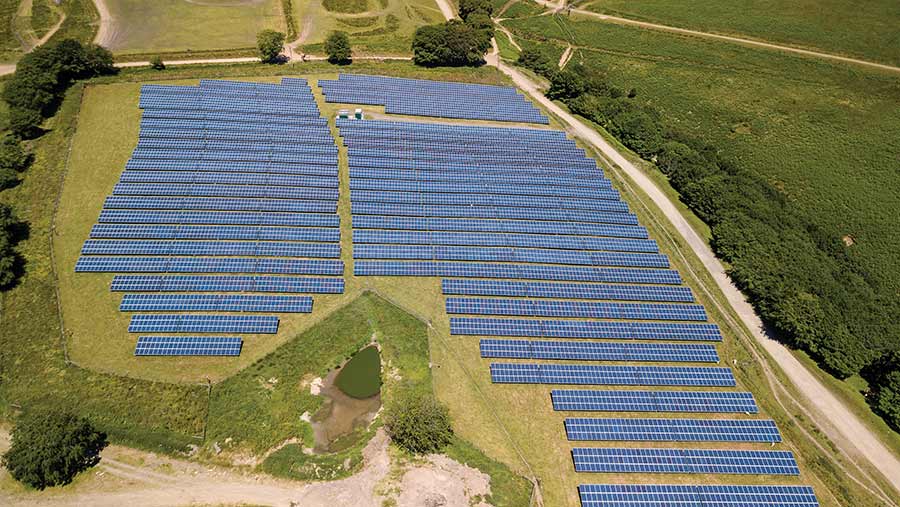Business Clinic: Is solar development still worth pursuing?
 © Richard Whitcombe/Adobe Stock
© Richard Whitcombe/Adobe Stock Whether you have a legal, tax, insurance, management or land issue, Farmers Weekly’s Business Clinic experts can help. Martin Williams, an associate in Carter Jonas’ energy team, sets out how solar developments are still well worth the consideration of many landowners.
Q. I have a 300-acre mixed farm in Devon. I considered turning some of my land into a solar farm previously when FiT was around, but didn’t manage to get it sorted. I’m still interested, but have I missed the boat now? If not, how do I know if my land is suitable, and is it worthwhile?
In 2015, the UK government took away subsidies for solar. This dramatically affected the viability of solar developments and, as a result, the market for standalone solar schemes took a nose-dive, with many developers withdrawing from the UK market.
However, recently the cost of PV panel technology has significantly reduced, alongside an increase in their efficiency, making solar development in the UK viable again.
Breakdowns and issues are becoming less frequent, the PV panels run for longer and cost less to maintain, and emerging technology such as tracking and bi-facial panels increase generation.
See also: Can we benefit from biodiversity offsetting?
While previous schemes were typically proposed to be installed for a 25-year period, now solar farms are typically proposed to have a 35- to 40-year lease term.
If developers are able to develop larger scale solar farms, operated for longer using the same kit, they can spread the cost over time, making projects viable.
In short, you definitely haven’t missed the boat.
The first thing to consider is the suitability of your land. Typically, to get planning consent, solar farm developments need to avoid the best agricultural land (ideally Grade 3 or below) and be free of any sensitive environmental designations.
Grid connection is also key; a site needs to be within about 5km of a substation, or have suitable overhead lines crossing the land that can be connected into the grid. A specialist adviser will be able to tell you quite easily if this is the case.
In addition, sufficient area is needed. All developers will have their opinion on the area required, and the scale will depend on the grid connection, but it’s generally accepted that 80 acres and above would be viable. This can be made up of your land and neighbouring land.
It sounds as if your land certainly ticks a lot of the boxes. So it is going to be worthwhile? In short, yes. An operational solar farm can have great financial benefit.
Developers typically seek a lease term of at least 35 years, paying an annual index-linked rent and in some cases a percentage revenue share top-up rent, with the land restored to its previous condition at the end of the term.
The rents offered to landowners vary significantly depending on the site, but for large scale solar farms, rents should be in excess of £800/acre, and can be £1,000/acre.
Any percentage revenue share should at least match the base rent, and this is an important element to ensure that landowners benefit from any increase in generation, or in the event that a developer is able to secure a higher price for the generated electricity.
Many developers are also seeking to incorporate battery energy storage systems into their solar farm designs, which should attract an additional rent based on a sum per megawatt.
Other benefits of a solar farm include maintenance and grazing rights, with most developers allowing sheep grazing around the PV panels and, in some cases, paying for this service.
It is important to remember, though, that these are large scale, long-term projects.
Key aspects to consider are the longevity of the developer and its ability to sell the project, the tax implications for you or your business, and the proposed insurance, indemnities, and decommissioning and reinstatement obligations of the developer.
Should a developer approach you, we would always recommend you take expert advice, to see if what you are being offered is not only in line with market rates, but also the best terms and the most appropriate for the landholding in the long run.
Do you have a question for the panel?
Outline your legal, tax, finance, insurance or farm management question in no more than 350 words and Farmers Weekly will put it to a member of the panel. Please give as much information as possible.
Email your question to FW-Businessclinic@markallengroup.com using the subject line “Business Clinic”.

